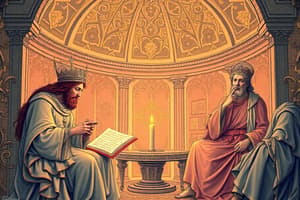Podcast
Questions and Answers
What is the primary reason according to Plato for humanity's failure to recognize good?
What is the primary reason according to Plato for humanity's failure to recognize good?
- Ignorance of what is considered good. (correct)
- Lack of love in their lives.
- Society's influence on morality.
- People are innately malicious.
What does St. Augustine argue is necessary for achieving real happiness?
What does St. Augustine argue is necessary for achieving real happiness?
- Following God’s commands. (correct)
- Self-knowledge and personal growth.
- Building relationships with others.
- Pursuing love for physical possessions.
Which type of love does St. Augustine consider to be the supreme virtue?
Which type of love does St. Augustine consider to be the supreme virtue?
- Love for self.
- Love for humanity.
- Love for power.
- Love for God. (correct)
According to Rene Descartes, which process is fundamental to human existence?
According to Rene Descartes, which process is fundamental to human existence?
Which of the following best represents Descartes' view on the relationship between mind and body?
Which of the following best represents Descartes' view on the relationship between mind and body?
In Descartes' philosophy, what does the phrase 'Cogito, ergo sum' imply?
In Descartes' philosophy, what does the phrase 'Cogito, ergo sum' imply?
Which sin does St. Augustine associate with excessive love for other individuals?
Which sin does St. Augustine associate with excessive love for other individuals?
What did Descartes believe about the cognitive aspects of human nature?
What did Descartes believe about the cognitive aspects of human nature?
Flashcards are hidden until you start studying
Study Notes
Allegory of the Cave
- Represents humanity's ignorance shaped by societal norms and conventional ethics.
Plato's Theory of Being
- Human beings are inherently good but may act evilly due to ignorance of the true good.
- Achieving truth requires a transformation into the essence of truth.
- Love is a means to transition from ignorance to perfect knowledge.
St. Augustine of Hippo
- Focuses on God’s commands rather than self-knowledge and happiness as life goals.
- Distinguishes two realms: God as the ultimate reality and human sinfulness.
St. Augustine’s View of Human Nature
- Ultimate happiness is found in God, who embodies love, rather than in earthly pursuits.
- Disordered love arises when people prioritize wrong objects over the love of God.
- Various loves can lead to specific sins:
- Love for physical objects leads to greed.
- Excessive love for others breeds jealousy.
- Love for oneself can manifest as pride.
- True happiness is achieved through love for God, the highest virtue.
René Descartes
- Emphasizes reasoning as central to human existence, involving investigation, analysis, and conclusion-making.
- Identifies two key powers of the human mind:
- Intuition: Immediate recognition of certain truths.
- Deduction: Systematic discovery of truth.
Cartesian Philosophy
- Renowned for "Cogito, ergo sum" - "I think, therefore I am," emphasizing thought as proof of existence.
- Views thinking as encompassing doubts, affirmations, and feelings, linking cognitive aspects to self-identity.
Mind-Body Problem
- Descartes posits that the mind (self) is a separate substance distinct from the body.
- Proposes that bodily processes operate mechanically, separate from mental processes.
Studying That Suits You
Use AI to generate personalized quizzes and flashcards to suit your learning preferences.




